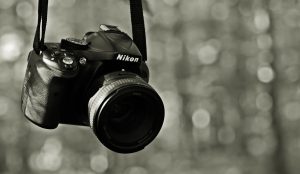The Ethics of Photography in Fundraising and International Development Work
As an industry that uses photography to tell stories and raise funds, do some of our practices do more harm than good?
I enjoy photography. Not the act of taking photos per se but the act of studying them once they have been taken. My favorite type of photography is portrait photography. That is, photos of a person or a group of people.
As a child, one of my favorite pastimes was flipping through National Geographic magazines. I favored the editions that featured photos of people more than the ones that featured photos of animals and plants. I would stare at the images of the people on the pages, and wonder what their story was, and what it meant to see the world through their eyes.
Growing up in Kenya, this is what the world looked like through my eyes. For the most part, life was uneventful. I would wake up, go to school, play with my friends during breaktime, come home, do my homework, eat supper, play with the dogs (and the puppies if a new litter had been born), and then go to bed. I would repeat the same routine the next day with slight variation- sometimes I would wake up late, and consequently, I would get to school late, and that often meant a rough start to the day. But for the most part, things were routine.
What also came to be routine were the visits from the wazungus. They would visit the school and they would sing and dance with us. They gave us sweets and toys and they told us stories about snow and thanksgiving. They took photos of us, and with us. And then they went away and a new group would arrive and we would do the same song and dance with them. They all left with photographs of us, but few ever took the time to learn our names and hear our stories. Perhaps to them, it didn’t matter who we were. Perhaps to them all those young smiling faces in the photos were all the same – different people yes – but all the same, and for this reason our stories didn’t matter. Or perhaps they didn’t need to know our names and our stories because they weren’t important or relevant. Perhaps they thought our stories would be too painful to hear or that they would challenge their preconceptions of the African child. Perhaps all these, some of these, or none of these thoughts run through their minds when they took photos of us, without our parents’ knowledge and without their consent.
Months after they left, I thought about them. I wondered what they did with our photos and what stories they told– those who knew nothing about us and the lives we lived.
My thoughts on taking photographs
People much wiser than I have written far more eloquently than I could on this topic. I have provided a few links to their articles below. For what it’s worth, here is my two cents on the subject. Never assume you have the right to take a photo. You don’t. Always ask for permission first.
Talk to the people you are about to photograph and get to know them. Who are they? What are their stories? Understand the power dynamics inherent in development work. Respect the dignity and privacy of the people you are about to photograph. If you are travelling for work and are required to take photos of the beneficiaries of the program, always give them the option to opt in and opt out of having their photo taken. Always be transparent about how their photos and the stories they share will be used. Before taking a photograph of a child always ask the child and the guardian for permission before you take the photo. It’s a small courtesy and it shows respect.
Further Reading:
Taking Photos – or Requesting them? The Ethics of Travel Photography
https://www.responsibletravel.com/copy/ethics-of-travel-photography
Ethics and Photography in Developing Countries
https://www.uniteforsight.org/global-health-university/photography-ethics
Photographers Without Borders – Code of Ethics
https://www.photographerswithoutborders.org/code-of-ethics/
Water Aids Approach to Ethical Image Use:
https://washmatters.wateraid.org/blog/wateraids-approach-to-ethical-image-use
The ethics of using images from Humanitarian aid NGOs
http://nonprofit.xarxanet.org/news/ethics-using-images-humanitarian-aid-ngos
Ethical Photography Guide
https://www.fsd.org/2017/05/ethical-photography-guide/
When You Shouldn’t Take that Picture
https://expertphotography.com/travel-photography-ethics-when-you-shouldnt-take-that-picture/
Jonea Agwa is a Fundraising and Communications Coordinator by profession and a proud African woman by heart.







